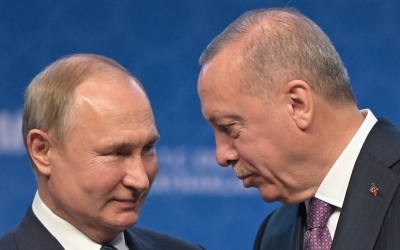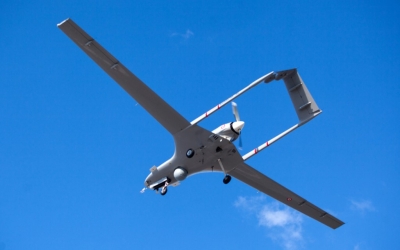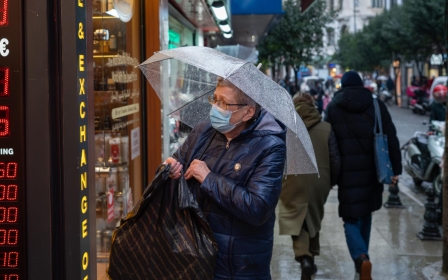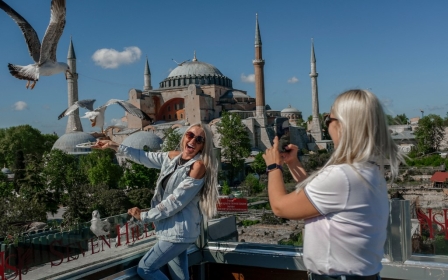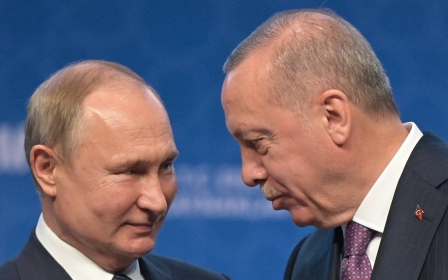Turkey: How Russia-Ukraine war could set back recent economic gains
“Oh, no,” a Turkish travel agent bemoaned, as yet another pre-sold tour package cancellation appeared on his screen while he was speaking to Middle East Eye on Friday.
“I hope this war doesn’t last long. Otherwise, we don’t know how to survive,” said Levent Nizamoglu, the executive at an Istanbul-based tourism agency that organises tour packages for Russian tourists in Istanbul and its adjacent regions.
“We don’t know what to do. We don’t know what to tell the hotels. We don’t know who will compensate us for these losses, and how,” he said.
Nizamoglu is one of many in Turkey's tourism sector who are feeling anxious after the Russian invasion of Ukraine.
'We don't know who will compensate us for these losses, and how'
- Levent Nizamoglu, Turkish travel agent
There are many causes for concern: the closure of airspace in Ukraine, the fear that Turkey will not maintain its neutral stance in this conflict, as well as the memories of 2015, when Turkey downed a Russian jet for allegedly violating Turkish airspace, triggering a political and economic crisis with Russia.
New MEE newsletter: Jerusalem Dispatch
Sign up to get the latest insights and analysis on Israel-Palestine, alongside Turkey Unpacked and other MEE newsletters
“This war will be a huge blow to us,” Nizamoglu said, fearing that Russian state employees were now no longer allowed to leave their country.
But it's not just the tourism sector in Turkey that will be stung by the fallout of the war.
On Thursday, Turkey’s trading markets woke up with a shock as Russia launched a full-scale invasion of Ukraine. The stock exchange fell by more than nine percent, while the Turkish lira suffered a more than five percent loss against the US dollar.
This agitation in the markets came at a time when Turkey had been struggling to stabilise the lira and prevent inflation hikes through the introduction of several economic measures, tax reductions and state subventions.
By Friday, Turkish markets had managed to compensate for some of the losses even as the value of companies that operate in Ukraine and Russia continued to depreciate. On the other hand, the lira, which stood at 13.50 against the dollar a week ago, has rebounded a little from Thursday’s shock and now stands at just over 14 to the dollar.
The Russia-Ukraine conflict has proven one thing - the Turkish lira is fragile. While Ankara has been working hard to stop its freefall against the dollar, Russia’s invasion is too close for comfort, and will likely strike a hard blow to nearby Turkey’s tourism industry.
Tourism revenues play a major role in Turkey’s economy, as they bring foreign currencies into the country and help narrow the trade budget deficit.
Last year, Turkey’s tourism income doubled to $25bn, and its trade deficit fell 7.5 percent year on year to $46.13bn in 2021, amid a currency crisis and the Covid-19 pandemic.
In December, the lira suffered a 30 percent depreciation against the dollar, but quickly regained around 15 percent in value, after the government declared that the Central Bank and the Treasury would guarantee any loss against the US currency, should citizens convert their deposits to lira and invest in interest-bearing accounts. The government also waived some taxes while reducing others.
Ankara’s diplomatic manoeuvres
According to several surveys, these measures have a direct impact on performance in the polls, as the ruling government has managed to halt the downward spiral in its public support.
Yet, the latest crisis is likely to hinder Turkey’s efforts to stabilise its economy, given the fact that Ankara is already tangled up in the conflict, due to an array of reasons, including Ukraine’s demand to close the Bosphorus and Dardanelles straits to Russia, the indispensable economic relations with both countries, and the sale of armed drones to Kyiv.
Turkish officials were aware that this conflict would put Turkey in the spotlight, leaving it difficult to maintain an indifferent front.
At the start of the crisis, Turkey refrained from choosing sides or making harsh statements about Russia, given its fragile relations with Moscow – the two countries’ interests differ not only in Ukraine but also in Syria and Libya.
Ankara reiterated its readiness for mediating between the two earlier this month. Turkish President Recep Tayyip Erdogan told his Russian counterpart, Vladimir Putin, in a telephone conversation on Wednesday, a day before the invasion, that “both countries [Ukraine and Russia] were unique to Turkey”.
Following Moscow’s invasion, the Turkish foreign ministry issued a written statement in which Russia’s attacks were described as “unlawful and unacceptable”. Erdogan also said Turkey was rejecting such an invasion and supporting Ukraine’s territorial integrity.
Balancing act
One of the apparent reasons for Turkey’s initial cautious language is its economic relations with both countries, especially with Russia, which is an important buyer of Turkish agricultural goods, exporter of natural gas, and supplier of large numbers of tourists.
Prior to the coronavirus pandemic, Turkey’s trade budget with Russia was around $20bn annually, but Covid-19 caused a 20 percent decrease in trade volume. Even so, the two countries managed to surpass pre-pandemic figures through signing several trade deals. Last year, the trade budget reached $30bn, while the two countries reiterated on several occasions their commitment to increase it to $100bn.
But not all developments play in Ankara’s favour. While Russia becomes one of Turkey’s largest trade partners, it also causes a considerable trade deficit, since Moscow’s exports to Ankara are almost twice higher than its imports.
At this point, tourism carries a significant role in balancing, or at least narrowing, this deficit, as well as in luring much-needed foreign currency to Turkey.
In 2019, seven million Russian tourists visited Turkey. In 2020 and 2021, this number was around five million and 4.5 million respectively.
On the other hand, Ukraine has emerged as a new trading partner for Turkey’s qualified goods, such as defence industry and technologies, while providing crucial agricultural goods. The trade budget between Kyiv and Ankara remains around $5bn annually, but the aim is to double that, after Erdogan signed a free trade deal on his last visit to the country early this month.
Despite the small volume of bilateral trade, Turkey has been a tourism centre for Ukrainians as well. Last year, more than one million Ukrainians visited Turkey despite the pandemic.
The truth is, both Russia and Ukraine are regarded as lifelines for the Turkish economy.
“This year, Turkey was expecting more than 10 million tourists from Ukraine and Russia combined,” Firuz Baglikaya, head of the Association of Turkish Travel Agencies, told Anadolu Agency. “This war will likely have an impact on European tourists, too,” he added.
Businesses on tenterhooks
Asim Ozcan, like Nizamoglu, is a tourist agency owner in Istanbul who works directly with Ukrainians. He, too, is anxious. “All reservations have been cancelled. What else can I say?” he told MEE over the telephone.
On the other side of the country, Mehmet Karakaplan, a hotel manager in Antalya’s Manavgat district, a famous destination among Russian tourists, said: "We haven’t received any cancellations, but need to wait for a few weeks to fully understand what will happen. Still, we’re worried, as we were expecting to have a good season after the pandemic... plus our revenues have taken a significant hit due to increased expenses.”
'No flight, no ship. We are literally paralysed, don’t know what to do'
- Burak Alporgun, Turkish trader
It’s not only tourism providers and hotels who are monitoring the conflict with unease. Exporters are also in fear for the future of their businesses.
Burak Alporgun, who sells furniture connection pieces to Ukraine, told MEE that he didn’t know what would happen, whether his company would send its goods or collect its money from Ukrainian partners.
“No flight, no ship. We are literally paralysed, don’t know what to do,” he said, desperately.
Middle East Eye delivers independent and unrivalled coverage and analysis of the Middle East, North Africa and beyond. To learn more about republishing this content and the associated fees, please fill out this form. More about MEE can be found here.


